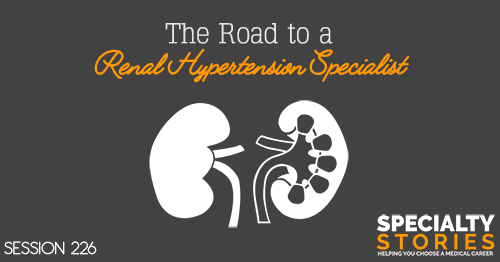Apple Podcasts | Google Podcasts
Session 212
Today, we have Dr. Dave Margolis, a physician specializing in pediatric cancer and blood disorders. Let’s talk about how he got into the specialty.
For more podcast resources to help you with your medical school journey and beyond, check out Meded Media.
Listen to this podcast episode with the player above, or keep reading for the highlights and takeaway points.
[01:07] Interest in Pediatric Hematology
Dave’s interest in the field sparked after attending a lecture in the second year of medical school. He remembers working with the said doctor/lecturer in taking care of a specific patient with aplastic anemia.
During his first year of residency, he also ended up working with a physician who became his mentor. So how he got into the field was because of both the subject itself and the people he latched onto and guided him in this direction.
[02:55] The Biggest Traits That Make Someone Be a Good Pediatric Chemo Doc
Dave says a person must want to have longitudinal relationships and somebody who’s interested in basic science because hematology is very much a science-driven field. They should also be willing to deal with lots of different patient populations.
[04:30] The Biggest Myths or Misconceptions Around Pediatric Hematology
One of the misconceptions around the field is that you’re dealing with death all day long. Dave states that while he had gone to more funerals than many of his peers and other specialties, the trade-off is they have very intense, positive relationships with families and patients. He has been to more weddings and bar mitzvahs because of those intense relationships.
'The good news in 2021 and beyond is that fewer patients die from cancer and blood disorders.'Click To Tweet[05:57] Types of Cases
The most common type of cancer in pediatrics is brain tumor. Not all of those require an oncologist, but many brain tumors require a surgeon. The most common liquid tumor is leukemia.
At any pediatric cancer center, leukemia will probably have the highest percentage of kids that are under their care. Not all of those are brain tumors but kids with brain tumors require their care.
Then there are abdominal tumors of childhood called Wilms’ tumor or neuroblastoma that require a pediatric hem-onc physician’s care. The last group would be bone tumors such as osteosarcoma and Ewing sarcoma. They also handle Hodgkin’s disease.
As a bone marrow transplant sub-specialist, Dave says by the time patients get to him, they usually have their diagnosis. But for his colleagues that are generally peds hem-onc, they get to play detective an awful lot, and he says it’s the fun part of the job. Dave says being Sherlock Holmes is actually part of the fun because they spend a lot of time trying to figure out what Mother Nature has thrown at them.
'Most of the time, we get to play detective and come to a diagnosis.' Click To Tweet[09:13] What a Bone Marrow Transplant Specialist Does
As bone marrow transplant specialists, they could change people’s bone marrow systems and immune systems. He describes a kid’s immune system like you’re operating on Mac and you’re a PC person, they will switch you to a PC. And so, they spend a lot of time managing the complications that come along with switching from Mac or PC or PC to Mac.
'We work on changing the operating system of the blood-forming system and immune system to fix the underlying problem, which is likely due to your blood-forming and immune systems.”Click To TweetDave adds that very little of it is procedure-based. They do minimal procedures such as bone marrow harvests, bone marrow aspirates, and spinal taps. But they don’t do a whole lot of surgery as their colleagues do for transplants like the kidney, the liver, and the heart.
They spend a lot of time trying to deal with the immune effects of the treatments they use to get that transplant in.
[10:53] Typical Day
Dave says everything is on the computer now. Depending on how compulsive one is, you can actually wake up, rollover, and look at your patients’ labs. And it’s not unusual for him to do that, especially when they’re waiting for somebody’s light cells to grow and look up the complete blood count.
A typical day, for instance, would be doing multidisciplinary rounds with a team at around 8:30 am. On a good day, he likes to see his patients before rounds so he gets up to the ward at around 7:30 am. Rounds usually take about an hour, sometimes a little bit more, sometimes a little bit less. And then it’s just managing problems and dealing with issues all day long.
He would tell his wife that he’s pleasantly surprised he’s leaving before five o’clock in the evening and always disappointed if he’s still at the hospital past six o’clock in the evening.
[13:12] Taking Calls & Life Outside of the Hospital
As a bone marrow transplant doctor over the years, he thinks he comes in the middle of the night less than 10 times a year. He learned from his mentor early on that if you think about coming in then you come in. And so, this is how he runs his life.
It also depends on how big of a group practice you’re in, where you’re likely to take calls more than five times and under 15 times a year. Hence, it depends on the team of people you work with, and the culture of your institution.
Dave is also happy to have a life outside of the hospital, not having missed any of his kids’ events. In fact, his call schedule was based on the Packers call schedule. There was a time where there were only two of us doing bone marrow transplants so they had to take calls on every other day. And this is one of the reasons he chose this specialty.
[16:23] The Training Path
After medical school, you spend three years of residency in pediatrics and then three years of fellowship in hem-onc. They do two years in the lab, or others will try to do two years to get a graduate degree. Dave chose the lab path.
Then there are some bone marrow transplant one-year fellowships, but it’s not an ACGME-approved fellowship. There are some apprenticeships where you just get a job and you take it. Overall, the training is a good six years plus.
[17:19] Overcoming Negative Bias Towards DOs
Dave likes to say they are a DO-philic institution. Some of his favorite doctors and some of his personal doctors over the years are DOs. And so far as he’s concerned, there’s no hurdle to overcome and they might be a little bit more enlightened than maybe some other institutions. But they’ve had chief residents and program leaders who are DOs.
'Whether you're MD or DO, we just want you to be an intellectually curious, great person. And we don't care so much about whether you're a DO or an MD.'Click To Tweet[18:30] Message to Our Future Pediatricians
Dave wants our future primary care physicians to know that more and more of their patients will be survivors. The good news is that more and more of those times where you diagnose cancer, you will get those patients back and they will be long-term survivors in your clinic.
That being said, Dave says it’s their responsibility to keep those relationships going when the patient is being cared for and work with their general pediatricians long-term.
[19:22] Other Specialties They Work the Closest With
In Dave’s practice, he works a lot with pediatric critical care and pediatric emergency medicine. They talk to the ER when anybody comes in. They work a lot with critical care pediatric infectious diseases because they dismantle immune systems. Hence, their patients are at risk of getting infections. They also work with dermatology and gastroenterology, and they interface with just about everybody.
[20:59] Most and Least Liked Things
Dave says he’s glad that you can have a work-life balance, which he keeps telling his residents how important it is. Dave has seen too many people who don’t pay as much attention to work-life balance as maybe they should.
What he likes most about his specialty are the doctor-patient relationships, the memories, and the impact you make on a patient and the family.
'The term empathy matters is very, very true.'Click To TweetIn terms of interacting with the parents, Dave points out that the parents just want their kids to do well. And it’s their job to work with them and explain that to them. And so, he would not be afraid of those parents.
Instead, he just thinks of it being in those parents’ shoes. And so, you don’t have to be a parent, to be a great pediatrician. But he learned from one of his mentors that when you are a parent, you just have to take what you’ve learned, and integrate that into your career as a pediatrician.
On the flip side, what he likes the least is when children die. It doesn’t happen very often but it definitely sticks with you. Mostly, these are relapsed diseases. That being said, there’s always that healthy second-guessing that goes on that you learn from. They do that in an organized fashion where they review all of the deaths, which they take very seriously.
And so, if somebody grants them the honor of doing an autopsy, they come together as a team and review the autopsy to see what they can learn and try to prevent that from happening.
[26:27] Major Changes Coming Into the Field
Dave says that it’s going to be more and more individualized targeted therapy and that gene therapy will replace some of what they do in Bone Marrow Transplant. He thinks there will be advancements in chemotherapy that may limit the need to do transplants.
And Dr. Bryan Druker helped identify Gleevec, a tyrosine kinase inhibitor that treats CML (chronic myelogenous leukemia) much more intelligently than they used to. And CML is almost never an indication for transplant anymore that he can’t even remember the last time they transplanted somebody for CML.
[29:41] Final Words of Wisdom
If he had to do it all over again, Dave says he still would have chosen the same path because he loves what he does. He considers himself the luckiest guy in the world because he has got a family that deals with him as well as a team that he loves working with, and patients that he loves working with.
Dave encourages medical students who are looking to go into a field there that there are lots of rewarding areas of medicine. Find the area that fits with you, your own personality and your skill set.
'Play to your strengths. Limit your weaknesses and make sure you love what you do.'Click To TweetLinks:
SEARCH SITE
LISTEN FOR FREE












